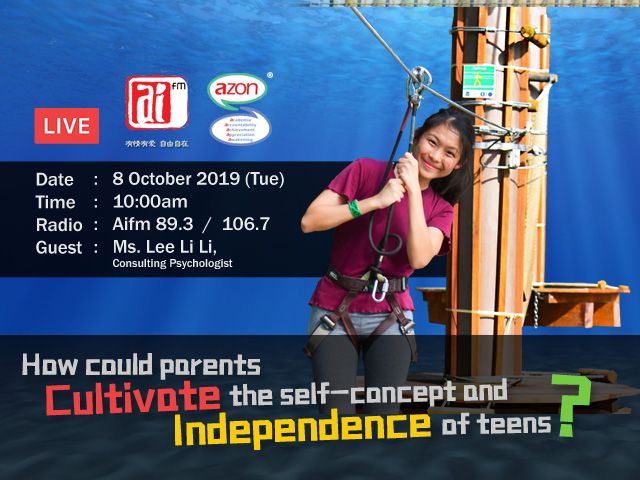 Dear parents and friends, it is a pleasure to have you listening to our consulting psychologist, Ms. Lee Li Li’s public sharing on the topic “How could Parents Cultivate the Self-Concept and Independence of Teens?”, on 8th October 2019, Tuesday, 10:00am, on Ai FM 89.3/106.7 Ai Ceria session.
Dear parents and friends, it is a pleasure to have you listening to our consulting psychologist, Ms. Lee Li Li’s public sharing on the topic “How could Parents Cultivate the Self-Concept and Independence of Teens?”, on 8th October 2019, Tuesday, 10:00am, on Ai FM 89.3/106.7 Ai Ceria session.I will do my duty to my best ability; I will do my house chores as it is my responsibility
Viability is important in our daily living. Without viability, children will fall into the comfort zone of life. For example, would your child wakes up on time independently if not being awakened by parents, such as by setting alarm before sleep? When a child is able to independently complete his or her tasks, the child starts to develop viability. There are two main values in cultivating the child’s self-concept and independence, that is self-reliance and responsibility. Many a time, parents use monetary or materialistic reward as a trade for their child to do house chores. But in fact, this is only a temporary solution and not an effective method to train independence. There is a need for a distinct definition of house chores and work, in which house chores develop responsibility whereas work develops self-reliance. The ability to complete a matter within one’s duties (such as house chores and homework) demonstrates the act of being responsible.
Q1: Is it advisable to give monetary rewards for good grades?
Academic homework is the responsibility of the child as a student, hence, it is not advised to use monetary nor materialistic reward as an encouragement. The child may earn monetary rewards through holiday work programmes, and learn to manage their money earned. When a child has won in a competition, encourage the child on sharing their achievements with the family, as their results are not from individual effort only, but also the companionship and support of the family.
Q2: Can parents reward additional leisure time for completing additional house chores?
It is not advisable to use extra leisure time as an exchange condition to do extra chores. However, parents may choose to do so, if the request is reasonable and parents would guide their child in managing their time. For example, will there be enough time to finish homework if play was prioritize first? In such, the child is able to develop assertiveness and decision making skills.
Q3: Why do other peers don't have to do chores?
Other than being firm in the responsibility given, parents should also guide their child in their problem solving skills. If the child is able to complete both house chores and homework and received the acknowledgement and affirmation from their parents, this would bring joy to the child. Besides, when the child realized his or her problem solving skills are better than his or her peers, the child would also be more compliant and accepts the chores assigned by parents.
Q4: My child has been over pampered, and would only play mobile phone instead of doing house chores. What should I do?
It is recommended to allow the child to participate in group activities, which allows observation of the differences between self and others. Based on comparative psychology, the child may start to develop the desire to learn. On the contrary, the child may also give up on himself. Nonetheless, with the cooperation of teachers and the build up of trust, the child may learn gradually of the skills.
Q5: When I assigned my child to do house chores, the elders at home felt that I am not taking care of my child.
It is recommended that parents do not confront directly to the elders nor ignore them, as our attitudes towards our elders are part of the learning process for the child. However, parents can explain to the elders as “It is an assignment by the teachers.” or allowing the child to seek the elders to learn the skills.
Please click this link to find out more, and to watch the full sharing:
Youtube
Note: The above content is adopted from Ai FM 89.3/106.7 (Ai Ceria) programme - “How Could Parents Cultivate the Self-Concept and Independence of Teens? ” on 8th October 2019. For more information, please kindly contact our office. It is our pleasure to request our consulting psychologist to assist you. Thank you.





